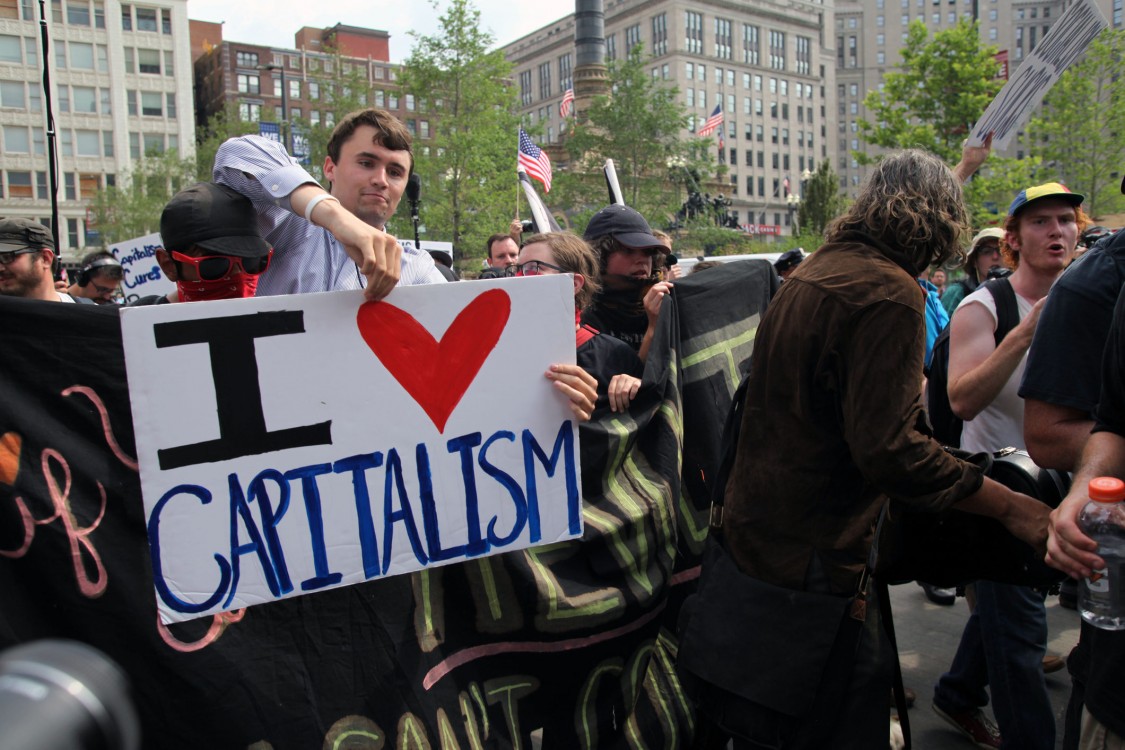
This is the first installment of a two-part article.
Being run by business, American culture suffers from an overwhelming preponderance of stupidity. When a set of institutions as reactionary as big business has a virtual monopoly over government and the media, the kinds of information, entertainment, commentary, ideologies and educational policies on offer will not conduce to rationality or social understanding. What you’ll end up with is, for instance, an electorate 25 percent of whose members are inclined to libertarianism.
And the number is even higher among young people. That is to say, huge numbers of people will be exposed to and persuaded by the propaganda of the Cato Institute, the magazine Reason, Ayn Rand’s novels, and Milton Friedman’s ideological hackery to express their rebellious and anti-authoritarian impulses by becoming “extreme advocates of total tyranny,” to quote Noam Chomsky.
They’ll believe, as he translates, that “power ought to be given into the hands of private, unaccountable tyrannies,” namely corporations. They’ll think that if you just get government out of the picture and let capitalism operate freely, unencumbered by regulations or oversight or labor unionism, all will be for the best in this best of all possible worlds. And they’ll genuinely believe they’re being subversive and anarchistic by proposing such a program.
The spectacle of millions adhering to such a breathtakingly stupid ideology would be comical if it weren’t so tragic. I’m an atheist, but Christianity strikes me as a more rational – and moral – religion than this “libertarian” (really totalitarian) one of absolute faith in universal privatization, marketization, corporatization, and commoditization. To be a so-called libertarian is to be deplorably ignorant of modern history, economics, commonsense sociology, human psychology, and morality itself.
(Regarding morality: if the Golden Rule is an essential maxim, then the communist slogan, “From each according to his ability, to each according to his need,” which is basically a derivative of the Golden Rule, is fundamental to any humane social organization. Greed and Social Darwinism – every man for himself – are hardly morally luminous principles.)
Given this reactionary philosophy’s intellectual sterility and the fact that it’s been refuted countless times, it’s tempting to simply ignore it. And most leftists do ignore it. But that’s a mistake, as the frightening figure quoted a moment ago (25 percent of the electorate) indicates. It’s necessary to challenge “free market” worship whenever and wherever it appears.
The economist Rob Larson has performed an important service, therefore, in publishing his new book Capitalism vs. Freedom: The Toll Road to Serfdom, the more so because the book’s lucidity and brevity should win for it a wide readership. In five chapters, Larson systematically demolishes the glib nostrums of Milton Friedman and Friedrich Hayek (in the process also dispatching those other patron saints of the right wing, Ludwig von Mises, Ayn Rand, and Murray Rothbard).
Even the book’s title is highly effective: the message “capitalism vs. freedom” should be trumpeted from the hills, since it challenges one of the reigning dogmas of our society. Liberals and leftists sometimes buy into the view that capitalism promotes freedom, arguing only that socialist equality and justice are more important than capitalist freedom. But this is a false framing of the issue. The fact is that socialism, which is to say workers’ democratic control of the economy, not only means greater equality and justice than capitalism but also greater freedom, at least for the 99 percent. It is freedom, after all, that has inspired anarchists and even Marxists, including Marx himself.
Larson begins with a brief discussion of two concepts of freedom, negative and positive (a distinction that goes back, as he notes, at least to Isaiah Berlin). Crudely speaking, negative freedom means the absence of external constraint, of a power that can force you to act in particular ways. Positive freedom is the ability or opportunity actually to realize purposes and wishes, to “control your destiny,” so to speak. It involves having the means to satisfy desires, as when you have the means to assuage hunger, be adequately clothed and sheltered, and have adequate sanitation. Positive freedom can be thought of as “freedom to,” whereas negative freedom is “freedom from.”
Classical liberals like John Stuart Mill and modern conservatives like Friedman and Hayek are more concerned with negative freedom, which explains their desire for a minimal state; socialists are concerned also with positive freedom, sometimes believing that a stronger state (e.g., a social democracy) can help ensure such freedom for the majority of people.
Friedman and Hayek argued that free-market capitalism, with minimal intervention by the state, is the surest guarantee of negative liberty. Larson’s book is devoted mainly to refuting this belief, which is widely held across the political spectrum; but it also defends the less controversial claim that capitalism is incompatible with widespread positive liberty, too. “Capitalism,” Larson writes, “withholds opportunities to enjoy freedom (required by the positive view of freedom) and also encourages the growth of economic power (the adversary of liberty in the negative view of freedom).”
That concentrations of economic power in themselves threaten negative liberty might be challenged, but this is a weak argument, among other reasons because it’s clear that centers of (economic) power will tend to dominate and manipulate the state in their own interest. They’ll construct coercive apparatuses to subordinate others to their power, which will itself enable further accumulations of power, etc., until finally the society is ruled by an oligarchy. Thus, from “pure” capitalism you get an oligarchy with the power to coerce.
However obvious this point may seem to those possessed of common sense, it’s far from obvious to libertarians and most conservatives. According to Friedman, “the kind of economic organization that provides economic freedom directly, namely, competitive capitalism, also promotes political freedom because it separates economic power from political power and in this way enables the one to offset the other.” Here we encounter the typical naïve idealism of conservatives (and, indeed, of centrists and liberals), which I’ve discussed at length here.
Rather than analyzing the real conditions of real social structures, conservatives traffic in airy abstractions about “freedom,” “the separation of political and economic power,” the lofty virtues of “competitive capitalism,” and so on. Evidently it doesn’t occur to Friedman that economic power will tend to confer political power, and therefore that, far from offsetting each other, the two will be approximately fused. The economically powerful might not directly hold political office, but because of the resources they possess, they’ll have inordinate power and influence over political leaders. This is intuitively obvious, but it’s also borne out by empirical research.
It’s worth pointing out, too, something that Larson doesn’t really focus on: Within corporations, freedom, even negative freedom, is severely curtailed. In the absence of a union, the employee has hardly any rights. There’s no freedom of expression, for example, and the boss can threaten you, manipulate you however he wants, verbally abuse you, or behave horrendously towards you with probably no repercussions for himself.
Capitalism in fact is a kind of fragmented totalitarianism, as privately totalitarian corporate entities proliferate all over society and constitute its essential infrastructure, its foundation. The more oligopolistic they become, to some degree even fused with the state, the less “fragmented” and more dangerous the totalitarianism is. Eventually the “libertarian” millennium might be achieved in which all countervailing forces, such as unions, are eradicated and the population is left wholly at the mercy of corporations, reveling in its sublime freedom to be totally dominated.
Larson is right that “in portraying [the] concentration of money in society as a reasonable development” – e.g., as a reward for successfully competing against other capitalists – “the libertarian tradition completely dismisses the power of concentrated money.” Hayek, for example, claims that in a “competitive society” (a meaningless abstraction: different kinds of societies can be “competitive”) nobody possesses excessive power. “So long as property is divided among many owners, none of them acting independently has exclusive power to determine the income and position of particular people.”
Okay, fine, maybe not exclusive power, but to the degree that property is divided among fewer and fewer owners, these people can achieve overwhelming power to determine the income and position of others. Such as by acquiring greater “positive freedom” to dominate the state in their interests and against the interests of others, who thus proportionately lose positive freedom and possibly (again) even negative freedom, e.g. if the wealthy can get laws passed that restrict dissidents’ right to free speech or free assembly.
More generally, it goes without saying that positive freedom is proportional to how much money you have. It apparently doesn’t bother most libertarians that if you’re poor and unable to find an employer to rent yourself to (in the gloriously “free, voluntary, and non-coercive” labor market), you won’t be able to eat or have a minimally decent life. Hopefully private charities and compassionate individuals will come forward to help you; but if not, well, it’s nothing that society as a whole should care about. Strictly speaking, there is no right to live (or to have shelter, food, health care, education, etc.); there is only a right not to be interfered with by others (except in the workplace). What a magnificent moral vision.
Libertarians admit that concentrations of wealth emerge in capitalism, but they deprecate the idea that capitalism leads to competition-defeating market concentration in such forms as oligopolies, monopolies, and monopsonies (like Wal-Mart). Usually these are created, supposedly, by government interference. But most businessmen and serious scholars disagree, pointing, for instance, to the significance of economies of scale.
The famous business historian Alfred Chandler showed that many industries quickly became oligopolistic on the basis, in large part, of economies of scale. Historian Douglas Dowd observes that large-scale industrial technology has made it both necessary for firms to enlarge and possible for them to control their markets, while Australian economist Steve Keen argues that “increasing returns to scale mean that the perfectly competitive market is unstable: it will, in time, break down into oligopoly or monopoly.”
Larson might have gone further in this line of argument by emphasizing just how much capitalists hate market discipline – i.e., the “free market” – and are constantly trying to overcome it. They’re obsessed with controlling markets, whether through massive advertising campaigns, destruction or absorption of their competitors, price-fixing and other forms of collusion, or the formation of hundreds of trade associations.
The historian Gabriel Kolko’s classic study The Triumph of Conservatism: A Reinterpretation of American History, 1900–1916 revealed that the hatred of market anarchy is so extreme that Progressive-era oligopolists were actually the main force behind government regulation of industry (to benefit business, not the public), as with the Meat Inspection Act of 1906, the Pure Food and Drug Act, the Federal Reserve Act, the Clayton Antitrust Act, and the Federal Trade Commission Act. Andrew Carnegie and Elbert H. Gary, head of U.S. Steel, even advocated government price-fixing! So much for the corporate propaganda about how wonderful free markets are.
Chris Wright has a Ph.D. in U.S. history from the University of Illinois at Chicago, and is the author of Notes of an Underground Humanist, Worker Cooperatives and Revolution: History and Possibilities in the United States, and Finding Our Compass: Reflections on a World in Crisis. His website is www.wrightswriting.com.
















